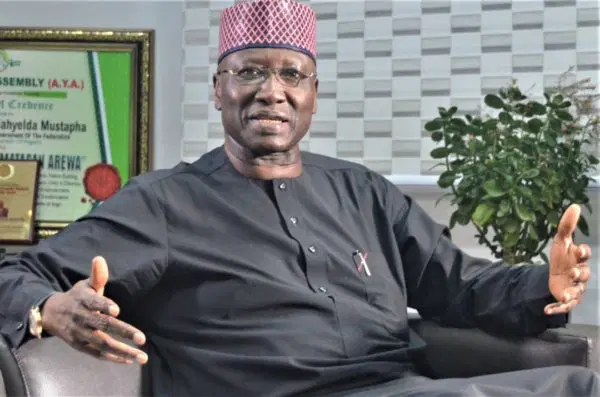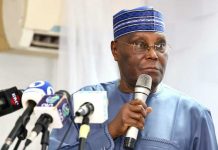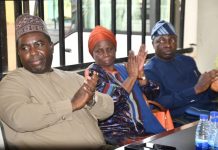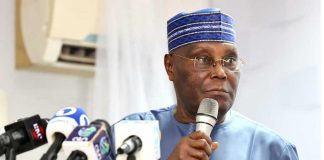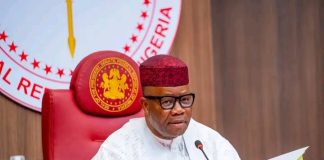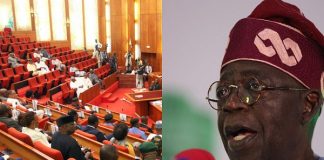🌿 Ruzu Non-Alcoholic Herbal Bitters
Ruzu Non-Alcoholic Herbal Bitters is a natural health supplement specially formulated to:
- ✅ Promote general wellness
- ✅ Detoxify the body
- ✅ Support the treatment of various ailments
Made from a powerful blend of 100% organic and medicinal herbs, Ruzu is completely alcohol-free, making it ideal for:
- 👪 All age groups
- 🌱 Health-conscious individuals
- 🌿 Anyone seeking non-alcoholic herbal remedies
Whether you're looking to boost your vitality, cleanse your system, or support healing the natural way, Ruzu Bitters offers a trusted herbal solution.
In light of the fact that certain individuals elected Muhammadu Buhari president in 2015, Boss Mustapha, the former secretary to the government of the Federation, claimed that his win in that year was the result of votes cast by devoted supporters.
This is even as General Yakubu Gowon (rtd), the former head of state, characterized Buhari as a man of honesty, a man of austerity, and someone who was steadfast in his commitment to the unity of Nigeria.
The two were present for the book launch of Garba Shehu’s book, “According to the President: Lessons from a Presidential Spokesperson’s Experience.” A memoir that provides an uncommon inside look at presidential communications and the weight of allegiance in the halls of power.
The former SGF refuted the widely held belief that the leaders of the now-defunct Action Congress of Nigeria (ACN), which is now a part of the APC, were the only ones responsible for the APC’s 2015 victory. He claimed that Buhari already had 12 million votes and that the merger of the legacy parties only added three million.
Read Also: Okonkwo: Region Doesn’t Matter, ADC’s Priority Is Ousting Tinubu
To be clear, Buhari served as the focal point. In a statement that seemed to implicitly contradict myths around President Bola Ahmed Tinubu’s contribution to the merger’s success, Mustapha stated, “The votes that delivered victory in 2015 came from Buhari’s loyal followership, even though the CPC only had one state.”
Gowon recalled some of Buhari’s early acts as president, such as when he objected to a N10 million catering budget for the State House, saying it was too much and demanding a significant reduction.
“If it must be said, General Buhari leads a spartan existence. You can’t deny that he has Nigeria’s best interests at heart, regardless of what people may think of him,” Gowon stated.
He hailed the Armed Forces for their efforts and commended Buhari’s administration for trying its best to address the nation’s growing problems, particularly insecurity.
Additionally, Gowon praised Garba Shehu for his consistent support of Buhari’s policies throughout the years.
“Malam Shehu and other spokespeople are crucial. “A president must communicate their actions and policies in a clear and consistent manner, and Garba Shehu did so with courage and loyalty,” Gowon continued.
Gowon’s sentiments were mirrored by President Bola Ahmed Tinubu, who was represented at the occasion by Senator George Akume, the Secretary to the Government of the Federation. He gave Buhari credit for reforming institutions and establishing a leadership style based on responsibility, caution, and patriotism.
Tinubu said, “Buhari’s legacy is one of focused intent to reposition Nigeria, from restoring fiscal discipline to confronting insecurity head-on, from expanding infrastructure to transforming agriculture.”
Noting that Buhari’s foreign policy remained principle-driven and deliberate, with Nigeria’s voice valued throughout the African Union and international community, the President further lauded Nigeria’s diplomatic constancy under Buhari.
Shehu’s book is a critical eyewitness account of government throughout two administrations, according to former Vice President Yemi Osinbajo.
He emphasized Shehu’s background as an academic who formerly taught journalism at Bayero University in addition to her work as a media assistant.
As a teacher, he has stayed loyal to his vocation. Beyond being a memoir, this book serves as a teaching tool for students, communicators, and political historians, according to Osinbajo.
Former Chief of Staff Prof. Ibrahim A. Gambari, who served as the launch’s chief presenter, emphasized the book’s scholarly and policy significance.
He commended Shehu’s analysis of Buhari’s most difficult problem, which he described as “the perception problem and the tyranny of high expectations” rather than insecurity or economics.
“The book provides a road map for public servants, communication specialists, and presidential aides navigating a media environment full of spin and false information,” Gambari stated.
He emphasized the book’s contributions, such as a significant essay by North Dakota State University professor Charles Okigbo that examines how fake news threatens presidential communication tactics.
Shehu’s book has become more than just a political biography; it is a compelling account of loyalty, moral leadership, and the fine line that must be walked by those entrusted with supporting a president.
In the era of social media, it’s difficult for a leader to take bullets. However, the truth ought to be upheld. As Shehu pondered during his remarks, “I did it with pride, because I believed in the man and the mission.”

